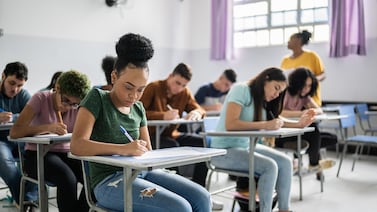Sign up for Chalkbeat Chicago’s free daily newsletter to keep up with the latest education news.
Chicago Public Schools may not provide busing next school year for general education students, CPS CEO Pedro Martinez said during a board meeting Thursday.
Martinez shared the update one day before families of elementary school children will receive admissions offers to magnet and selective enrollment schools, which provided busing to eligible students until this school year. The district is currently providing busing to students with disabilities and those who are homeless.
As a result, the district is extending the deadline for accepting school offers by a week, to April 19 at 5 p.m., Martinez said.
Martinez said the district is working to find other options for transportation, such as adjusting bell times, but for now, the district cannot guarantee busing for next year. The district remains under a state-issued corrective action plan that requires CPS to shorten bus commute times for students with disabilities to less than an hour. A Chalkbeat analysis in December found that hundreds of routes were carrying fewer than 10 students.
“We want to make sure families are aware of the challenges,” Martinez said during the meeting.
CPS canceled busing this year for about 5,500 general education students as it worked to ensure students with disabilities whose Individualized Education Programs call for transportation were getting it. The state required CPS to take multiple corrective actions over the past two years to ensure students with disabilities entitled to busing were receiving it and that their ride times were not longer than an hour.
The district is also now taking state-mandated corrective action for how it assigns students with disabilities to schools. Those assignments are often far away from where they live.
The district’s “unwavering commitment” to provide legally required transportation to students with disabilities and those who are homeless “has, admittedly, presented challenges in accommodating general education students,” said Mary Fergus, a district spokesperson, in a statement. The district said it has not attracted the number of drivers it needs, despite efforts to hire more of them that include increasing pay.
The district said Thursday it’s currently busing 8,700 students. As of December, nearly all of the students who received busing were students with disabilities.
For general education students, the district is offering prepaid Ventra cards, a move that has drawn criticism from families who don’t have the flexibility to accompany young children on public transportation. Additionally, about 3,700 students with disabilities have opted for stipends of up to $500 to cover their transportation needs on their own, down from 4,000 students at the start of the year, according to the district.
Currently, about 130 students with disabilities are on bus routes longer than an hour, according to CPS. That’s significantly down from the 3,000 such students on long routes last year, but it is up from 47 students at the start of the school year.
Many families with general education students at magnet and selective enrollment schools have protested the district’s decision and have demanded a stipend to cover their transportation costs. Some families who have struggled to juggle transportation have pulled their children out of magnet schools and enrolled them somewhere closer to home.
This week, 27 Chicago alderpeople signed a letter urging the district to make several changes to transportation, including to provide stipends to families with general education students.
“We cannot afford to live in Lincoln Park or Lake View, so please include transportation,” Laura Leon, the grandmother of a student who lost busing this year, said during the board meeting.
On Thursday, a district spokesperson said stipends are “not sustainable” this year as the district focuses on students with disabilities and homeless children, and faces a projected $391 million budget deficit next year.
Advocates have also suggested regional transportation hubs in which students would join an existing route. However, that has been a challenge to implement, Fergus said. Hubs “would work for some but not all routes, thus not serving all families and schools in an equitable manner, but, again, we will continue to explore all options for the coming school year.”
Reema Amin is a reporter covering Chicago Public Schools. Contact Reema at ramin@chalkbeat.org.






